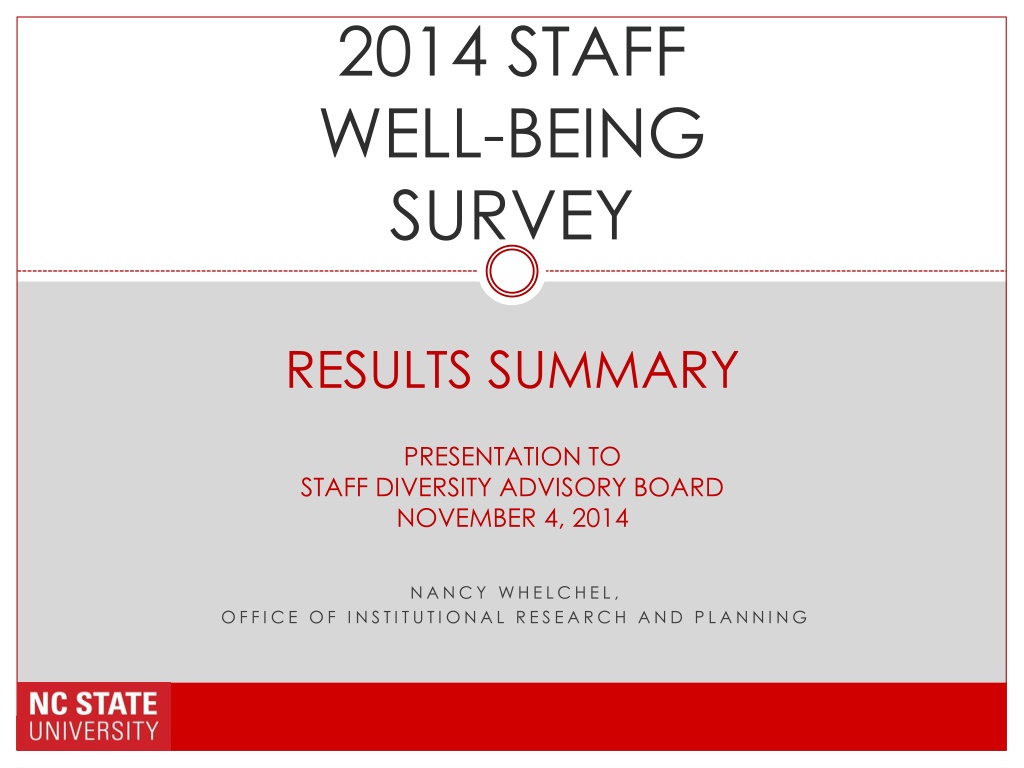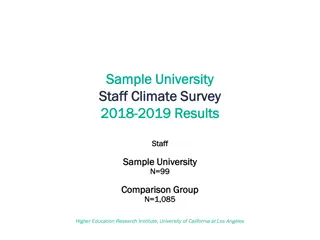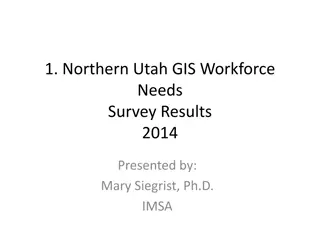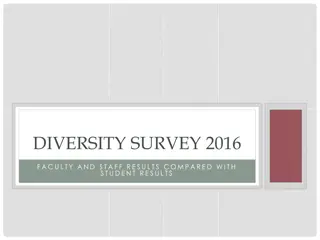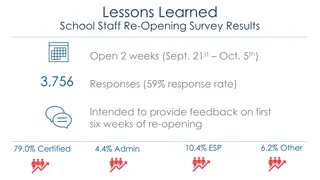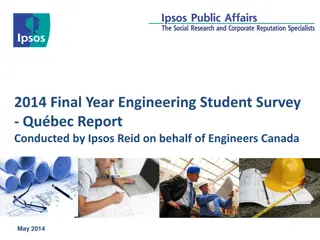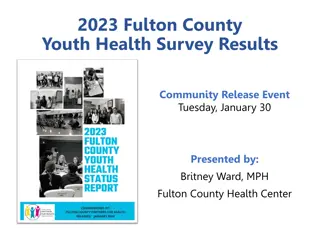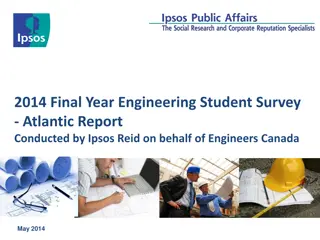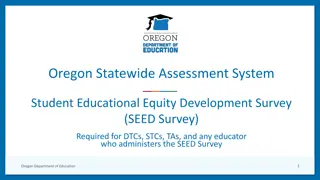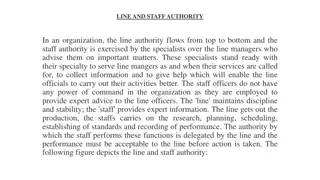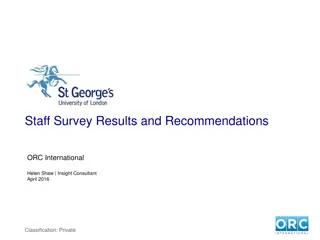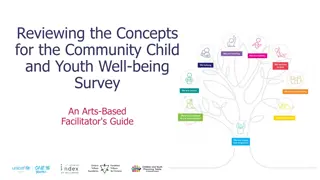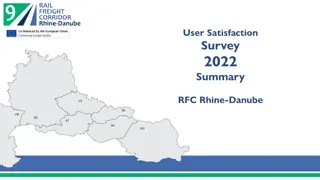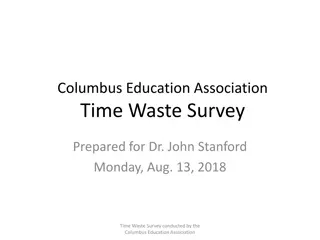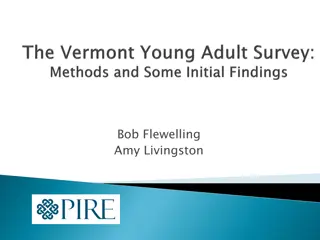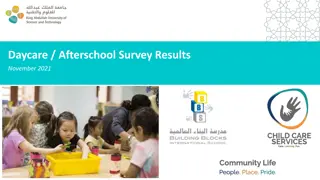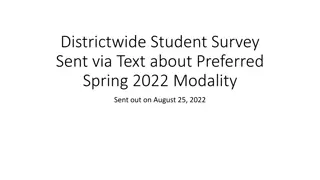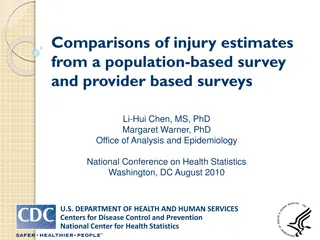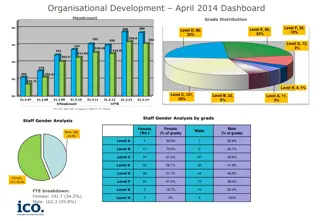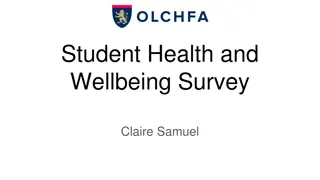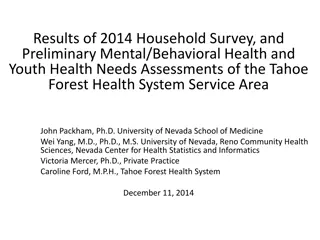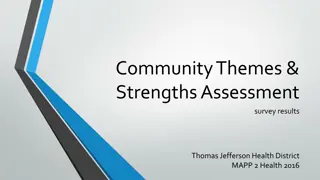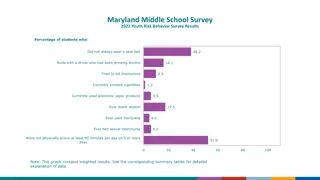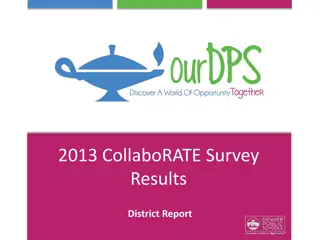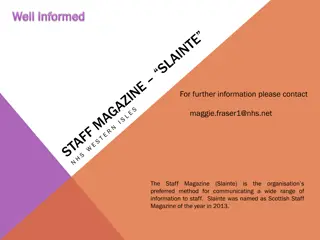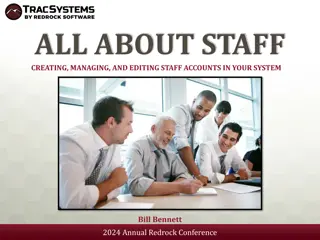2014 Staff Well-being Survey Results Summary Presentation
The presentation by Nancy Welch from the Office of Institutional Research and Planning on November 4, 2014, provided an overview of the survey administration, overall results, notable demographic differences, and next steps. It covered aspects like overall satisfaction, diversity, multiculturalism, and various work-related factors. The response rates and breakdown by different demographic groups were shared, highlighting the engagement of employees in the survey process.
Download Presentation

Please find below an Image/Link to download the presentation.
The content on the website is provided AS IS for your information and personal use only. It may not be sold, licensed, or shared on other websites without obtaining consent from the author. Download presentation by click this link. If you encounter any issues during the download, it is possible that the publisher has removed the file from their server.
E N D
Presentation Transcript
2014 STAFF WELL-BEING SURVEY RESULTS SUMMARY PRESENTATION TO STAFF DIVERSITY ADVISORY BOARD NOVEMBER 4, 2014 N A N C Y WH E L C H E L , O F F I C E O F I N S TI T U T I ON A L R E S E A R C H A N D P L A N N I N G
Overview Survey administration Overall results and trends Overall satisfaction Diversity and multiculturalism (A few additional) Notable demographic differences Next steps
When & How? When April 15 - June 10, 2014 How Online Paper copies distributed to those in skilled crafts and service maintenance Spanish version of paper surveys
What? Overall Satisfaction & Engagement Campus Climate and Diversity/Multiculturalism Work Activities Working Relationships Support & Professional Development Performance Evaluation Leadership & Supervision Salary & Benefits Vision and Direction Work/Life Balance Campus Infrastructure & Physical Environment Campus Recreational & Cultural Activities Demographics
Who? Permanent and time-limited Non-instructional Non-administrative employees (ES1 & ES2) 0.5 FTE Employed at least 6 months at time of survey No students, post-docs
Response Rates 54% 3,126 of 5,860 eligible employees participated Females slightly overrepresented Other groups (i.e., race, age, EPA/SPA, on-campus vs. off-campus, # of years employed) closely mirror survey population
Response Rate (by group) Population N Population % Respondent N Respondent % Response Rate 5,860 3,162 54.0% Overall Gender 2,589 44.2% 1,214 38.4% 46.9% Male 3,271 55.8% 1,948 61.6% 61.6% Female Race/Ethnicity 78 28 0.9% 35.9% 1.3% International 248 148 4.7% 59.7% 4.2% Unknown 213 97 3.1% 45.6% 3.6% Hispanic 22 10 0.3% 45.5% 0.4% Native American 185 81 2.6% 43.8% 3.2% Asian American 919 437 13.8% 47.6% 15.7% Black / African American 5 4 0.1% 80.0% 0.0% Pacific Islander 4,142 2,332 73.8% 56.3% 70.7% White 48 0.8% 25 0.8% 52.1% Multiracial/ethnic
Response Rate (by group, cont.) Population N Population % Respondent N Respondent % Response Rate Age 1,374 23.4% 755 23.9% 55.0% Under 35 yrs 1,517 25.9% 781 24.7% 51.5% 35-44 yrs 1,612 27.5% 871 27.6% 54.0% 45-54 yrs 1,357 23.1% 755 23.9% 55.6% 55 and over Years at NCSU 790 13.5% 459 14.8% 58.0% Less than 2 yrs 833 14.2% 443 14.0% 53.2% 2 to 4 yrs 17 27.5% 876 27.7% 54.4% 5 to 9 yrs 1,128 19.2% 592 18.7% 52.5% 10 to 14 yrs 736 12.6% 390 12.3% 53.0% 15 to 19 yrs 764 13.0% 403 12.8% 52.8% 20 or more yrs
Response Rate (by group; cont.) Population N Population % Respondent N Respondent % Response Rate Classification 1,909 32.6% 1,033 32.7% 54.1% EPA 3,951 67.4% 2,129 67.3% 53.9% SPA Occupation 19 0.3% 11 0.4% 57.9% Administrative 236 4.0% 132 4.2% 55.9% Instructional 2,583 44.3% 1,419 45.1% 54.9% EPA professional 826 14.2% 428 13.6% 51.8% Technical 1,171 20.1% 711 22.6% 60.7% Clerical 313 5.4% 165 5.2% 52.7% Skilled Crafts 681 11.7% 283 9.0% 41.6% Service/Maintenance Location 5,097 87.0% 2,742 86.7% 53.8% On-campus 763 13.0% 420 13.3% 55.0% Off-campus
Respondent Profile Spouse/partner works at NCSU: 8% Self/spouse is a protected veteran: 6% Has a qualifying disability: 2% Identifies as LGBQ: 5% Identifies as transgender: 0% Non-native English speaker: 6%
Most Favorably Rated Areas Areas receiving the most favorable ratings include those related to Work unit members Understanding job expectations, having and knowing how to use materials/tools for job Importance of flexible hours and tuition waivers for dependents Importance of sustainability University senior administration support for diversity
Most Favorably Rated Items 57% 37% Input on how accomplish work 59% 32% Univ sr admin promotes/supports diversity 59% 32% Work unit members get along 60% 28% Work unit members share info/ideas 62% 35% Access to a computer at work 62% 36% Know how to use materials/equipment for job 62% 31% Work plan fits goals of department 63% 28% Input on performance review (EPA) 63% 25% Supervisor gives permission to attend events 66% 28% Importance of tuition waivers for dependents 68% 25% Work unit members are hardworking 71% 26% Understanding of job expectations 72% 26% Importance of flexible work hours 73% 23% Work unit members know how to do jobs 76% 23% Importance of NCSU commitment to sustainability 0% 10% 20% 30% 40% 50% 60% 70% 80% 90% 100% Very Favorable Somewhat Favorable
Least Favorably Rated Areas Areas receiving the least favorable ratings tended to relate to Salary, recognition/rewards Understanding how resources are distributed Parking Communication & quality of relations between staff and senior leaders Annual Appraisals / performance reviews being helpful to career planning
Least Favorably Rated Items Quality of relations between staff and NCSU sr admin 11% 29% Understanding of resource distribution to own department 13% 27% Communication between staff and department sr admin 13% 27% Helpfullness of performance reviews to career planning (EPA) 5% 37% Availability of parking 18% 24% Salary compared to others in own department 18% 24% Dept sr admin resolving internal conflicts in work unit 19% 23% Supervisor publically appreciating your work 21% 22% Helpfullness of Annual Appraisals to career planning (SPA) 8% 36% Communication between staff and col/div sr admin 16% 30% Communication between staff and NCSU sr admin 14% 34% Compensation 14% 36% Salary compated to others in own college/division 20% 30% Incentives/recognition/rewards from department 25% 32% > 50% Salary compared to other NCSU colleges/divisions 24% 35% Understanding of resource distribution in college/division 25% 38% Understanding of resource distribution at NCSU 29% 38% Salary compared to other universities 32% 36% Cost of parking 35% 36% Salary compared to other Raleigh emps 43% 36% 0% 10% 20% 30% 40% 50% 60% 70% 80% 90% Very Negative Somewhat Negative
Trends: Areas of Improvement Several areas were rated more favorably in the 2014 SWBS that they were in the 2008 SWBS
Trends: Areas of Improvement (Percent giving a favorable response) Understanding of resource allocation to department 54% 6% Wolfline bus 84% 6% Stress from workload 44% 6% Competitiveness of retirement contributions 76% 7% Availability of parking 51% 7% Overall campus safety 85% 8% Dining options on campus 67% 8% Amount of "green space" on campus 81% 12% Availability of informal places to relax on campus 63% 14% Helpfulness of Annual Appraisals for career development (SPA) 64% 23% 0% 10% 20% 30% 40% 50% 60% 70% 80% 90% 100% % in 2008 %Pt increase in 2014
Trends: Areas in Decline Many (many) areas were rated less favorably in the 2014 SWBS than they were in the 2008 SWBS
Trends: Areas in Decline (Percent giving an unfavorable response) Department retaining effective/productive staff 29% 5% Communication between staff and col/dept sr admin 41% 5% Financial support for prof dev / training opportunities 26% 5% Work-related demands 21% 5% Communication between staff and univ sr admin 44% 5% Relations between staff and col/div sr admin 32% 6% Relations between staff and NCSU sr admin 34% 6% Opportunities for leadership development 25% 6% Opps to improve skills to increase chances for better job 25% 6% Salary compared to other universities 61% 8% Appropriate N people in work unit to do expected work 45% 8% Perf Reviews helpfulness to career development (EPA) 29% 8% Salary compared to others in own college/division 42% 8% Helpfullness of Annual Appraisals to career planning (SPA) 34% 8% Salary compared to other NCSU coleges/divisions 50% 8% Salary compared to others in own department 32% 9% Incentives/recognition/rewards from department 48% 10% Compensation 38% 11% More or less satisfied at NCSU than 3yrs ago 22% 12% 0% 10% 20% 30% 40% 50% 60% 70% 80% % in 2008 %Pt increase in 2014
Overall Satisfaction Overall satisfaction is high, but the number saying they are very satisfied has declined slightly 100% 2% 2% 9% 13% 90% 80% 70% Very dissatisfied 60% 60% 61% Dissatisfied 50% Satisfied 40% Very satisfied 30% 20% 29% 24% 10% 0% 2014 2008
Satisfaction Compared to Recent Years Compared to the 2008 survey, staff are more likely to say their satisfaction has declined in recent years 100% 6% 9% 90% 16% 80% A lot less satisfied now 25% 70% 31% Somewhat less satisfied now About the same 60% 50% 32% 40% 29% 30% Somewhat more satisfied now A lot more satisfied now 22% 20% 10% 18% 12% 0% 2014 2008
Overall Satisfaction: Demographic Differences Less likely to be currently very satisfied at NC State: LGBT Persons with a disability Less likely to be a lot more or somewhat more satisfied at NC State than they were a few years ago: Whites LGBT
Overall Satisfaction: Various Indicators Large majorities of staff derive satisfaction from their jobs in a number of ways Proud to work at NCSU 52% 43% Like people in work unit 47% 49% Feel like make a difference 37% 52% Feel like "fit" in dept 37% 49% Work give sense of purpose 35% 53% Would recommend dept as place to work 33% 50% Find work enjoyable 31% 57% Feel valued in dept 31% 50% Look forward to work 30% 55% 0% 10% 20% 30% 40% 50% 60% 70% 80% 90% 100% Strongly agree Agree
Overall Satisfaction: Various Indicators There is some variation among demographic groups in satisfaction with various aspects of their work Notably Less Likely to "Strongly Agree" Women X AfAmer Hispanic LGBT X Disability X X Look forward to work X X Feel valued in department Find work enjoyable X X Recommend department Work give sense of purpose X X X Feel like "fit" in department X Feel like make a difference X X Like people in work unit Proud to work at NCSU
Leaving NC State 17% have very seriously considered leaving NC State in the past year or two (excluding for retirement) - - slightly more than the number saying so in 2008 100% 90% No-Did not consider 80% 41% 50% 70% Yes-Considered but not very seriously 60% 50% 21% 16% 40% Yes-Somewhat seriously considered 30% 20% 20% 20% Yes -Very seriously considered 10% 17% 14% 0% 2014 2008
Why Consider Leaving? Those who had very seriously or somewhat seriously considered leaving NC State were asked to describe why. (N comments=1,049) Responses were coded into 15 broad themes, each with a number of sub-themes. (Each comment could be coded into any number of themes and/or sub-themes)
Why Consider Leaving? Themes % of respondents mentioning Salary/Benefits 48% Work Unit Environment 31% Professional development / Career Appreciation/Respect 26% 15% Personal Workload 11% 10% 9% 9% 7% 6% 5% 4% 2% 1% 3% Mismatch w/ Skills/Interests Resources / Support University Administration/Management Mission/Direction Job Security Bureaucracy Work / Life Balance Diversity Other 0% 10% 20% 30% 40% 50% 60%
Why Consider Leaving : Demographic Differences Gender Women are more likely than men to mention Workload Work unit environment Appreciation/respect Personal reasons Men are more likely than women to mention Resources/support Race/Ethnicity Whites are more likely than others to mention Workload Resources/support White, Asians, & Hispanics are more likely than African Americans to mention Salary/benefits African Americans are more likely than other to mention Work unit environment Appreciation/respect
Why Consider Leaving : Demographic Differences Sexual Orientation / Gender Identity LGBT are more likely than non-LGBT to mention Workload Resources/support Appreciation/respect Disability Status Staff with a disability are more likely than those without to mention Workload Work unit environment Resources/support Personal reasons
Why Consider Leaving: Salary & Benefits % of comments mention 25% % of comments mention # of times mentioned # of times mentioned Theme Code Code Description compensation-general salary/compensation general/other 264 pay raise pay raise (general lack of) inequity (competitive with market rate/industry) inadequate compensation for increased workload (e.g., from budget cuts, increase responsibilities) benefits inadequate compensation for employee's skill set lack of merit raises inequity (with others at NCSU/other UNC schools/state employees) caps on raises due to banding / 15% rule new hires make more than current employees not working full-time (or substantial hours) compare with current position/ increase negotiation position 170 16% competitive salary 57 5% not paid for work duties 56 5% benefits 37 4% Salary/ Benefits 508 48% not paid for skill set 30 3% merit increase 26 2% pay inequity 21 2% banding caps 16 2% new hires make more 11 1% needs more hours 6 1% negotiate 1 0%
Why Consider Leaving: Salary & Benefits - - In their own words Salary & Benefits Salary & Benefits "I often consider leaving NC State to pursue a higher rate of pay and better benefits." "The process by which to get a meager salary increase is ridiculous." "My salary is so low, I am struggling."
Why Consider Leaving: Work Unit Environment % of comments mention % of comments mention # of times mentioned # of times mentioned Theme Code Code Description climate (ethics, morale, political, unpleasant, hostile, gossip, etc.) supervisors climate 142 14% supervisors management- general 89 8% management style 69 7% department issues within department 47 4% leadership- general leadership within work unit 45 4% Work Unit Environment 324 31% unfair treatment unfair treatment 33 3% co-workers co-workers 30 3% difficulty changing departments/ internal transfer lack of teamwork internal transfer 14 1% teamwork 13 1% communication poor communication 13 1% work unit issues within work unit 6 1% retribution retribution 4 0%
Why Consider Leaving: Work Unit Environment - - In their own words Work Unit Environment Work Unit Environment "I will leave because I cannot do my job under the current management. Management cannot make decisions, control conflict, improve morale, or generally manage." "Current hostile work environment with my supervisor is becoming unbearable."
Why Consider Leaving: Professional Development / Career Advancement % of comments mention % of comments mention # of times mentioned # of times mentioned Theme Code Code Description career advancement for career advancement 193 18% Professional Development / Career Advancement lack of professional growth/development opportunities at NCSU improper classification/job title/job description recruited by another organization professional growth 70 7% 272 26% classification 28 3% recruited 4 0%
Why Consider Leaving: Professional Development - - In their own words Professional Development Professional Development "Low pay, no opportunity for career advancement in my unit, no growth in my responsibilities, supervisor doesn't give chances to work on more complex tasks." "Very little advancement opportunity; little to no professional development support."
Why Consider Leaving: Appreciation/Respect % of comments mention % of comments mention # of times mentioned # of times mentioned Theme Code Code Description not valued/ recognized/respected/ no appreciation (not $$) Appreciation/ Respect not valued 155 15% 158 15% understanding SPA/EPA lack of understanding SPA vs EPA inequities 5 4 0% 0%
Why Consider Leaving: Appreciation/Respect -- In their own words Appreciation/Respect Appreciation/Respect "There have been many times over the past few years when I have felt not appreciated by my supervisors and administration. I often feel like I am expendable by my supervisor and administration." "I do not feel valued at all. I feel taken advantage of and not appreciated for the hard work that I do."
Most and Least Positive Aspects Working at NC State Staff were asked to comment in their own words on When you think about your own personal experiences at NC State University, what would you say are the most positive aspects of being a staff member here? (N comments = 1,810) What do you think are the most significant changes that should be made at NC State University to improve or enhance the quality of your work life here? (N comments = 1,731) Responses to each were coded in a number of themes and sub-themes (Each comment could be coded into any number of themes and/or sub-themes)
Areas for Improvement IMPROVEMENTS: TOP THEMES ( 10% of comments mention) # of respondents mentioning % of total comments 55% 30% 29% 26% 22% 22% 21% 21% 20% 19% 17% 16% 15% 14% 14% 13% 12% 12% 11% 11% 11% 10% 10% Theme Compensation and Benefits 965 Workload Colleagues Support 516 493 455 Compensation & Benefits Workload Colleagues Support Professional Development College/Dept. Leadership Employee treatment Recruitment/Retention Culture/Climate Infrastructure Recreation Mission Management/Administration Transportation/Parking Performance Review Work-Life Balance Diversity Communication Research Extension/Engagement/Outreach Leadership: Executive Officers Leadership: Supervisor Location Professional Development College/Dept. Leadership Employee Treatment Recruitment/Retention Culture/Climate Infrastructure 384 374 359 356 337 331 287 284 260 241 239 226 210 205 194 187 183 170 167 Recreation Mission Management/Administration Transportation/Parking Performance Review Work-Life Balance Diversity Communication Research Extension/Engagement/Outreach Leadership: Executive Officers Leadership: Supervisor (n= 1,731) Location
Areas for Improvement: Demographic Differences Whites are more likely to mention Support / resources Staff with a disability are more likely to make suggestions related to Colleagues Diversity Supervisors Management/ administration Salary / benefits Location Recreational opportunities LGBT are more likely to make suggestions related to Colleagues Diversity Supervisors Management/ administration University leadership Policies Professional development
Areas for Improvement In their own words Compensation & Benefits I need a raise - I know everyone else does too, but it is critical that I take a job where I make more money, whether it be at NC State or not. My student loan debt coupled with living expenses eats my entire paycheck every month, and I run out of money every month. I have been at my current salary since 9/2011. I wish there was a way I could "present my case" or show why I'm valuable to someone who could actually make a change. Workload I am increasingly burdened with more work, with no more staff assistance. I just need help with sharing the workload, but I am pretty sure that is not going to happen any time soon. So, a lot of things that need to be done get left by the way-side. Colleagues We are treated like crap by co-workers, students. Suggested areas of improvement for staff well-being at NC State Support We are not provided with the proper tools (personnel, equipment, etc.) to perform our jobs effectively.
Most Positive Aspects Working at NC State # of respondents mentioning POSITIVE ASPECTS: TOP THEMES ( 10% of comments mention) Colleagues 731 % of total comments Theme Compensation and Benefits 462 Culture/Climate 455 Colleagues 40% Job Characteristics 425 Compensation & Benefits 26% Professional Development 410 Culture/Climate 25% Job Characteristics 24% Support 343 Professional Development 23% Location 319 Support 19% Population Served 297 Location 18% Employee Treatment 275 Populations Served 16% 256 Reputation Employee Treatment 15% Reputation 14% Work/Life Balance 253 Work-Life Balance 14% Personal Contribution 232 Personal Contribution 13% Workload 230 Workload 13% College/Dept. Leadership 215 Leadership: Division/College/Dept 12% (n= 1,810) Extension 206 Extension/Engagement/ Outreach 11%
Most Positive Aspects: Demographic Differences Whites, Asians & Hispanics are more likely than African Americans to mention Colleagues Women are more likely than men to mention Salary / benefits Those under 35 years of age are more likely than those 35 and older to mention Salary / benefits Location Those without a disability are more likely than those with one to mention Colleagues Those who are not LGBT are more likely than those who are to mention Colleagues
Most Positive Aspects In their own words Colleagues I think that NC State is a great place to work. I love working here and enjoy all of my co-workers . Compensation & Benefits Every aspect of working for the University has been wonderful. The health care and retirement benefits could not be better . Culture/Climate The culture in my department, college, and (based on my interactions) other NC State units are consistently informed with respect, collegiality, and teamwork. This makes working at NC State an extremely satisfying experience . Positive aspects of staff employment at NC State
Institutional Emphasis on Diversity An increasing number believe it is very important for NC State to have an institutional emphasis on diversity 1-in-10 believe it is not very or not at all important 100% 3% 3% 7% 9% 90% 80% 33% 70% 38% Not at all important 60% Not very important 50% 40% Somewhat important 30% 57% Very important 50% 20% 10% 0% 2014 2008
Institutional Emphasis on Diversity Demographic differences Underrepresented minorities are much more likely to believe an institutional emphasis on diversity is very important Very important Disability 62% No Disability 56% LGBT 77% Non-LGBT 56% Hispanic 71% Asian 81% AfAmer 81% White 51% Women 61% Men 51% 0% 10% 20% 30% 40% 50% 60% 70% 80% 90% 100%
Recruiting and Retaining Underrepresented Minorities Overall, 80% or more agree their department actively works to recruit, retain, and support staff from underrepresented groups Numbers who strongly agree have declined slightly About 40% don t know (excluded from analyses) Support 32% 55% 9% 4% Retain 28% 54% 14% 5% Recruit 29% 51% 15% 5% 0% 10% 20% 30% 40% 50% 60% 70% 80% 90% 100% Strongly agree Agree Disagree Strongly disagree
